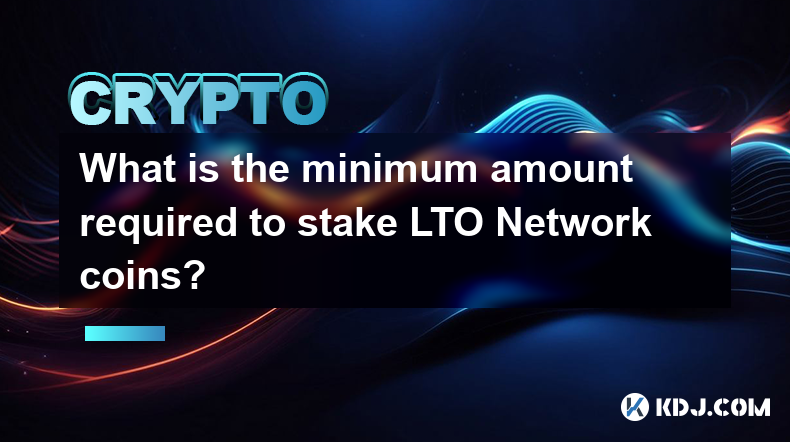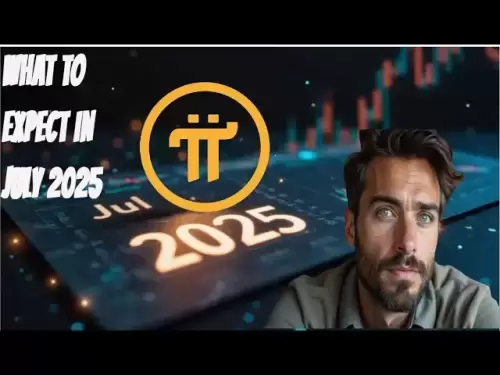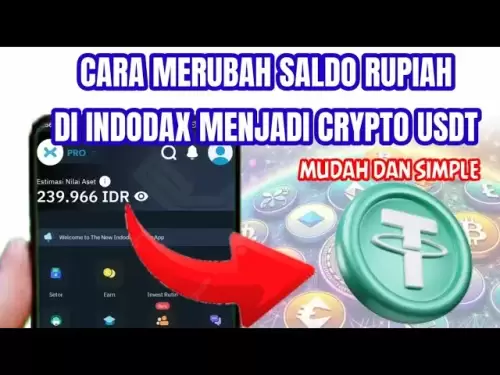-
 Bitcoin
Bitcoin $107,443.3008
-1.17% -
 Ethereum
Ethereum $2,494.2503
-0.63% -
 Tether USDt
Tether USDt $1.0003
0.00% -
 XRP
XRP $2.2496
2.23% -
 BNB
BNB $658.7569
0.63% -
 Solana
Solana $154.9826
1.94% -
 USDC
USDC $1.0000
0.01% -
 TRON
TRON $0.2799
1.07% -
 Dogecoin
Dogecoin $0.1659
-1.78% -
 Cardano
Cardano $0.5745
0.25% -
 Hyperliquid
Hyperliquid $39.7005
0.13% -
 Bitcoin Cash
Bitcoin Cash $519.5989
3.78% -
 Sui
Sui $2.7874
-2.40% -
 Chainlink
Chainlink $13.3762
-1.69% -
 UNUS SED LEO
UNUS SED LEO $9.0784
-0.64% -
 Avalanche
Avalanche $17.9846
-2.81% -
 Stellar
Stellar $0.2390
-0.06% -
 Toncoin
Toncoin $2.9028
0.25% -
 Shiba Inu
Shiba Inu $0.0...01147
-2.17% -
 Litecoin
Litecoin $86.6956
-1.27% -
 Hedera
Hedera $0.1508
-0.50% -
 Monero
Monero $322.6222
3.26% -
 Polkadot
Polkadot $3.4124
-2.99% -
 Dai
Dai $0.9999
0.00% -
 Bitget Token
Bitget Token $4.5434
-1.97% -
 Ethena USDe
Ethena USDe $1.0002
0.00% -
 Uniswap
Uniswap $7.1562
-2.61% -
 Aave
Aave $275.8830
-1.02% -
 Pepe
Pepe $0.0...09790
-4.04% -
 Pi
Pi $0.5018
-5.09%
What is the minimum amount required to stake LTO Network coins?
The minimum amount required to stake LTO coins on the native staking pool (lto.network) is 1,000 LTO.
Dec 26, 2024 at 02:40 pm

Key Points:
- Minimum staking amount varies across different platforms and exchanges.
- Staking rewards can differ depending on the platform and staking period.
- Delegators can delegate their tokens to a pool or a single validator.
- Staking contributes to network security and stability.
- LTO Network offers multiple staking options with varying rewards and benefits.
Understanding Staking Requirements for LTO Network Coins
Staking is a fundamental aspect of the LTO Network, a public blockchain designed for business applications. By staking LTO coins, users contribute to the security and stability of the network while earning rewards for their participation.
Minimum Staking Amount
The minimum amount required to stake LTO coins depends on the specific platform or exchange being used. Here is a breakdown of the minimum staking requirements across popular platforms:
Platforms and Minimum Staking Amounts:
- Binance: 5 LTO
- Kraken: 100 LTO
- KuCoin: 10 LTO
- Gate.io: 100 LTO
- LTO Network native staking pool (lto.network): 1,000 LTO
Choosing a Staking Platform
When selecting a staking platform, consider factors such as platform reputation, security measures, staking rewards, and fees. Research and compare different platforms to find one that aligns with your staking goals.
Benefits of Staking LTO Coins
Participating in the LTO staking program offers several benefits:
- Earn rewards: Stakers receive rewards in LTO tokens as compensation for contributing to network security.
- Support network security: Staking helps maintain the decentralized nature of the network, protecting it from malicious attacks.
- Gain voting rights: Stakers can participate in governance decisions by voting on proposals that shape the future of the LTO ecosystem.
- Contribute to ecosystem development: Staking rewards incentivize users to participate, fostering a robust and active network community.
Steps for Staking LTO Coins
To stake LTO coins, follow these steps:
- Acquire LTO coins: Purchase LTO coins from a reputable exchange.
- Choose a staking platform: Select a platform that meets your staking requirements and goals.
- Delegate your tokens: Transfer your LTO coins to the chosen platform and delegate them to a pool or a specific validator.
- Monitor your stake: Regularly check the status of your stake, rewards, and any associated fees.
FAQs
Q: What is the staking reward rate for LTO coins?
A: Staking rewards vary depending on the platform and staking period. Check the specific platform's website for the latest reward rates.
Q: Can I withdraw my staked coins at any time?
A: Staking periods vary across platforms. Some platforms offer flexible staking, allowing for immediate withdrawals, while others may have lock-in periods.
Q: Is it safe to stake LTO coins?
A: Staking LTO coins through reputable platforms is generally safe. Choose platforms with strong security measures and consider diversifying your stake across multiple validators to minimize risk.
Q: What are the benefits of staking LTO coins for a longer period?
A: Longer staking periods often yield higher rewards and contribute more to the network's stability. However, it's important to consider the lock-in periods and potential market volatility.
Q: Can I stake LTO coins directly from my hardware wallet?
A: Many staking platforms integrate with hardware wallets. Check the platform's documentation for supported hardware wallets and instructions for staking from your wallet.
Disclaimer:info@kdj.com
The information provided is not trading advice. kdj.com does not assume any responsibility for any investments made based on the information provided in this article. Cryptocurrencies are highly volatile and it is highly recommended that you invest with caution after thorough research!
If you believe that the content used on this website infringes your copyright, please contact us immediately (info@kdj.com) and we will delete it promptly.
- Donald Trump, TRUMP Memecoin, and the Latest Move: A New York Perspective
- 2025-07-01 17:10:12
- Cardano, Solana, XRP: Navigating the Crypto Seas in Q3 2025
- 2025-07-01 16:30:12
- Bitcoin Holders and the Price Hold: What's the Deal?
- 2025-07-01 16:50:26
- ChatGPT, Crypto Trading, and a $100K Profit: AI's Edge in the Wild West
- 2025-07-01 16:30:12
- Mutuum Finance Presale vs. Dogecoin: A New Challenger Approaches?
- 2025-07-01 16:50:26
- Memecoins to Buy in July 2025: Riding the Hype Wave
- 2025-07-01 17:10:12
Related knowledge

How to customize USDT TRC20 mining fees? Flexible adjustment tutorial
Jun 13,2025 at 01:42am
Understanding USDT TRC20 Mining FeesMining fees on the TRON (TRC20) network are essential for processing transactions. Unlike Bitcoin or Ethereum, where miners directly validate transactions, TRON uses a delegated proof-of-stake (DPoS) mechanism. However, users still need to pay bandwidth and energy fees, which are collectively referred to as 'mining fe...

USDT TRC20 transaction is stuck? Solution summary
Jun 14,2025 at 11:15pm
Understanding USDT TRC20 TransactionsWhen users mention that a USDT TRC20 transaction is stuck, they typically refer to a situation where the transfer of Tether (USDT) on the TRON blockchain has not been confirmed for an extended period. This issue may arise due to various reasons such as network congestion, insufficient transaction fees, or wallet-rela...

How to cancel USDT TRC20 unconfirmed transactions? Operation guide
Jun 13,2025 at 11:01pm
Understanding USDT TRC20 Unconfirmed TransactionsWhen dealing with USDT TRC20 transactions, it’s crucial to understand what an unconfirmed transaction means. An unconfirmed transaction is one that has been broadcasted to the blockchain network but hasn’t yet been included in a block. This typically occurs due to low transaction fees or network congestio...

How to check USDT TRC20 balance? Introduction to multiple query methods
Jun 21,2025 at 02:42am
Understanding USDT TRC20 and Its ImportanceUSDT (Tether) is one of the most widely used stablecoins in the cryptocurrency market. It exists on multiple blockchain networks, including TRC20, which operates on the Tron (TRX) network. Checking your USDT TRC20 balance accurately is crucial for users who hold or transact with this asset. Whether you're sendi...

What to do if USDT TRC20 transfers are congested? Speed up trading skills
Jun 13,2025 at 09:56am
Understanding USDT TRC20 Transfer CongestionWhen transferring USDT TRC20, users may occasionally experience delays or congestion. This typically occurs due to network overload on the TRON blockchain, which hosts the TRC20 version of Tether. Unlike the ERC20 variant (which runs on Ethereum), TRC20 transactions are generally faster and cheaper, but during...

The relationship between USDT TRC20 and TRON chain: technical background analysis
Jun 12,2025 at 01:28pm
What is USDT TRC20?USDT TRC20 refers to the Tether (USDT) token issued on the TRON blockchain using the TRC-20 standard. Unlike the more commonly known ERC-20 version of USDT (which runs on Ethereum), the TRC-20 variant leverages the TRON network's infrastructure for faster and cheaper transactions. The emergence of this version came as part of Tether’s...

How to customize USDT TRC20 mining fees? Flexible adjustment tutorial
Jun 13,2025 at 01:42am
Understanding USDT TRC20 Mining FeesMining fees on the TRON (TRC20) network are essential for processing transactions. Unlike Bitcoin or Ethereum, where miners directly validate transactions, TRON uses a delegated proof-of-stake (DPoS) mechanism. However, users still need to pay bandwidth and energy fees, which are collectively referred to as 'mining fe...

USDT TRC20 transaction is stuck? Solution summary
Jun 14,2025 at 11:15pm
Understanding USDT TRC20 TransactionsWhen users mention that a USDT TRC20 transaction is stuck, they typically refer to a situation where the transfer of Tether (USDT) on the TRON blockchain has not been confirmed for an extended period. This issue may arise due to various reasons such as network congestion, insufficient transaction fees, or wallet-rela...

How to cancel USDT TRC20 unconfirmed transactions? Operation guide
Jun 13,2025 at 11:01pm
Understanding USDT TRC20 Unconfirmed TransactionsWhen dealing with USDT TRC20 transactions, it’s crucial to understand what an unconfirmed transaction means. An unconfirmed transaction is one that has been broadcasted to the blockchain network but hasn’t yet been included in a block. This typically occurs due to low transaction fees or network congestio...

How to check USDT TRC20 balance? Introduction to multiple query methods
Jun 21,2025 at 02:42am
Understanding USDT TRC20 and Its ImportanceUSDT (Tether) is one of the most widely used stablecoins in the cryptocurrency market. It exists on multiple blockchain networks, including TRC20, which operates on the Tron (TRX) network. Checking your USDT TRC20 balance accurately is crucial for users who hold or transact with this asset. Whether you're sendi...

What to do if USDT TRC20 transfers are congested? Speed up trading skills
Jun 13,2025 at 09:56am
Understanding USDT TRC20 Transfer CongestionWhen transferring USDT TRC20, users may occasionally experience delays or congestion. This typically occurs due to network overload on the TRON blockchain, which hosts the TRC20 version of Tether. Unlike the ERC20 variant (which runs on Ethereum), TRC20 transactions are generally faster and cheaper, but during...

The relationship between USDT TRC20 and TRON chain: technical background analysis
Jun 12,2025 at 01:28pm
What is USDT TRC20?USDT TRC20 refers to the Tether (USDT) token issued on the TRON blockchain using the TRC-20 standard. Unlike the more commonly known ERC-20 version of USDT (which runs on Ethereum), the TRC-20 variant leverages the TRON network's infrastructure for faster and cheaper transactions. The emergence of this version came as part of Tether’s...
See all articles

























































































